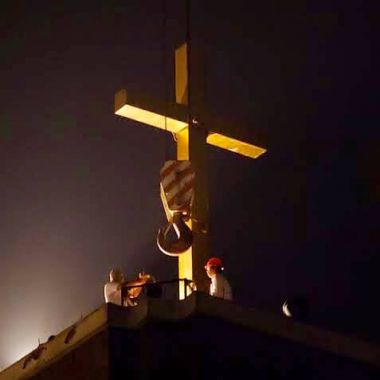Christians in eastern China left with the ruins after local officials burn down their church

Here's a reason for Christians to appreciate their place of worship: fellow faithful in eastern China have lost their church, but they are still carrying on by holding services in the ruins.
On the evening of May 20, Christians in Wenzhou, Zheijiang province, were left in a state of shock after local officials reportedly destroyed the government-sanctioned Zhuyang Church without warning.
According to the civil society group China Aid, the official Three-Self Zhuyang Church was razed despite the fact that Church members were still negotiating with local officials on how to preserve it.
Officials from a sub-district government office had reportedly discussed a possible relocation site and a fee for moving the church to another place before the church was reduced to ruins.
Chinese authorities said destroying the place of worship was necessary to improve and "transform the villages" in the city. Since April 2014, local officials of Wenzhou have been implementing the "Three Rectifications and One Demolition" initiative in an attempt to "beautify" the city and the rest of the province.
Despite this event, Christians who worship in the destroyed church still go there to conduct services.
Late last month, they placed protest banners on the ruins saying: "We are strongly opposed to this brutal, violent forced demolition," "The illegal principles of law enforcement are intolerable" and "The powerful are headstrong."
The churchgoers uploaded pictures and reports about the church demolition on Chinese social media site Weibo, but their posts were reportedly blocked or taken down.
"Before, the government said that religious matters would be handled with care, but now it doesn't care about religions at all," a church member was quoted by China Aid as saying. "Even churches with full legal documentation, if they fail to reach an agreement, will be brutally torn down by the government. The brothers and sisters of this church wonder if justice still exists."











